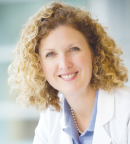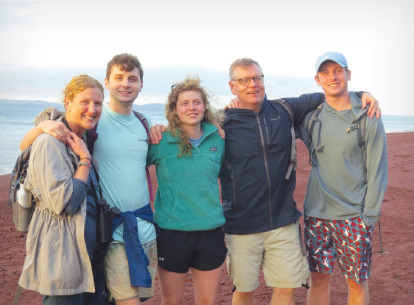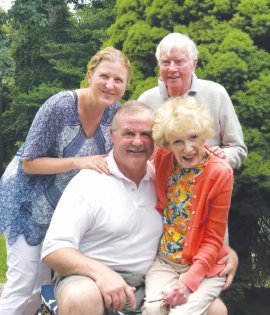Internationally recognized breast cancer expert Lisa A. Carey, MD, FASCO, was born in New Jersey and moved to Montreal, where she attended an all-girls school (Miss Edgar’s and Miss Cramp’s School for Girls) until age 8. When she was 9 years old, her father’s business ventures took the family back to Locust, New Jersey, a coastal community of metropolitan New York.

Lisa A. Carey, MD, FASCO
“It was tough moving back to New Jersey because by then, I had a funny Canadian accent. I was a summer baby and also skipped a grade, so I ended up graduating from Middletown High School South when I was just 16. I’d already been accepted to Wellesley College, but my parents were smart enough to know that college at 17 wasn’t a good idea. So, they sent me to Switzerland to attend a preparatory school, called Institut Le Rosey, where I got a little more maturity under my belt,” shared Dr. Carey.
An Early Decision to Become a Doctor
Dr. Carey decided to become a doctor when she was in high school. “When I went to Wellesley, I double-majored in biology and art history,” she said. “Up until my senior year, I was undecided between doing a PhD or an MD degree. As it happened, my honors thesis professor took a job with Louisiana State University (LSU) School of Medicine and invited me there to his lab so I could finish my work up and figure out what I wanted to do—which is what I did.”
NAME
Lisa A. Carey, MD, FASCO
TITLE
Division Chief and Associate Director for Clinical Research, University of North Carolina, Hematology/Oncology and Lineberger Comprehensive Cancer Center, Chapel Hill, North Carolina
MEDICAL DEGREES
MD, The Johns Hopkins University School of Medicine, Baltimore, Maryland
NOTABLE HONORS
Breast Committee Co-Chair of the Alliance for Clinical Trials in Oncology (2016)
National Cancer Institute’s Director’s Service Award (2011)
University of North Carolina’s commencement speaker (2009)
Johns Hopkins Society of Scholars (2008)
National Cancer Institute’s Career Development Award (2000)
Doris Duke Clinical Scientist Award (1999)
While at the LSU School of Medicine, the chair of the physiology group that Dr. Carey was involved with was recruited to a new institute under the auspices of the University of Kentucky. “Nine months into my work, I got moved to Kentucky with all the other postdoctoral and grad students. I spent another 9 months in the lab finishing up my work, and by that time I’d already decided on medicine,” she explained.
The Hopkins Experience
Dr. Carey interviewed at several places and was accepted to Johns Hopkins. “It was a wonderful opportunity, and I immediately fell in love with the space and the facility itself. I also met some very interesting people, one of whom was a famous urologist who helped me through the interview process—an experience I’ll never forget.”
The Hopkins Experience
Dr. Carey continued: “A neighbor of ours said that their friend worked at Hopkins and arranged for him to give me a ride on the day of my interview. Dr. Patrick Walsh picked me up in his car; when we arrived at Hopkins, he stuck me in his office and told his assistants to take good care of me. That was a great way to kick off my time at Hopkins, although it wasn’t exactly a normal day.”
In her first year at Hopkins, Dr. Carey met another medical school classmate who would later become her husband and future Chair of Neurosurgery at the University of North Carolina (UNC).
“The patients with cancer and their families are incredible. It’s like they represent how the human spirit blossoms when things in life get really tough.”— Lisa A. Carey, MD, FASCO
Tweet this quote
“I loved the Hopkins experience, so after attaining my MD, I stayed there for my internal medicine residency. In my junior year over the Christmas holiday, I was assigned to the cancer center; I thought to myself that I was in for an awful experience, taking care of people with cancer who are in the hospital over the holidays. To my surprise, it was just the opposite. The patients with cancer and their families were incredible. It’s like they represented how the human spirit blossoms when things in life get really tough. Interacting with these patients did not depress me; it inspired me. That experience catalyzed my decision to pursue oncology.”
Mentors Who Made a Difference
During her fellowship, Dr. Carey was still interested in research. At Dr. Nancy Davidson’s urging, she began a graduate degree program in Clinical Investigations at the School of Public Health at Johns Hopkins. “Nancy Davidson, who’d been my mentor in medical school and residency, said I should do clinical research in testing biomarkers if I wanted to make changes. So, I went to Sara Sukumar’s lab and ended up staying for 3 years while receiving my degree in clinical investigations,” she explained.
When Dr. Carey began looking for positions, many people suggested she check out UNC. “I spoke to Shelly Earp, MD, who was Director of the Lineberger Comprehensive Cancer Center,” she added. “He made a compelling case for me to join UNC, stressing they needed a translational clinical person to develop tissue-oriented breast cancer trials. I have been here since finishing my fellowship.”
“Eric Winer has been there for me from the beginning. He’s just a terrific person aside from being a great clinical doctor.”— Lisa A. Carey, MD, FASCO
Tweet this quote
Dr. Carey shared another aside about her mentor, past ASCO President, Nancy Davidson. “In 2009, I was asked to give the December commencement speech at UNC. I didn’t know what to wear. Nancy had taken care of Carol Johnson Johns after she was diagnosed with cancer. Carol was a world-renowned expert on lung disease and basically started the field of sarcoidosis, founding the Sarcoid Clinic at Johns Hopkins. For a time, she was also President of my alma mater, Wellesley College, where Nancy also went. After she died, Carol’s husband gave Nancy her full commencement regalia from Hopkins, but Nancy’s terminal degree was from Harvard, so she couldn’t use it. Lo and behold, before my speech, a big package from Nancy is delivered to my door. It was Carol Johnson Johns’ bumblebee-looking yellow and black cap and gown from Hopkins. That solved my problem and was such a lovely gesture!”
Asked about a mentor for her breast cancer career, Dr. Carey said without hesitation, it was Eric P. Winer, MD. “One of the special things about the breast cancer community is that it’s collaborative, and people are mutually supportive, which I think is one reason we’ve been so successful. Eric has been there for me from the beginning. He’s just a terrific person aside from being a great clinical doctor.”
National Stage: Joining CALGB
As her early career objectives clarified, Dr. Carey searched for a way to bring her research ambitions to the national stage. “When I got to UNC, I realized I didn’t have a mechanism to get involved with things on the national level. As it happened, I ran into Antonio Wolff at an American Association for Cancer Research meeting and asked him how to get out there. He told me to start showing up at meetings and volunteering. The Chairs of Cancer and Leukemia Group B (CALGB) at that time were Drs. Larry Norton and Hy Muss. I cold-called Hy and gave him my pitch, asking if I could come to his meeting. He said sure, so I began showing up and never stopped.”
Busy but Rewarding Career
Dr. Carey is currently Division Chief of UNC Hematology/Oncology and Associate Director for Clinical Research at Lineberger Comprehensive Cancer Center, where she is responsible for promoting clinical sciences across all cancer programs with a particular emphasis on developing clinical trials. She oversees research facilities that emphasize correlative science, the measurement of biologic responses in the conduct of prevention and treatment trials. “We do a lot of research in the clinical implications of molecular subtypes of breast cancer. I have a pretty busy schedule,” said Dr. Carey.

Dr. Carey vacationing on Galapagos Islands with her son Kelly, daughter Abby, husband, Dr. Matt Ewend, and son Nash.
Early in her career, she was the lead author of a seminal article in The Journal of the American Medical Association examining breast cancer molecular subtypes within racial and menopausal subsets and a Clinical Cancer Research article that first explained the paradox of high chemosensitivity but poor outcomes among certain types of breast cancer; these collaborative institutional efforts kicked off work she fosters more broadly now. More recently, she was the study chair of CALGB 40601, a phase III neoadjuvant trial examining dual vs single HER2 targeting that was designed to report clinical and translational endpoints simultaneously. According to Dr. Carey, this was particularly gratifying. “We found that while treatment mattered, it didn’t matter as much as tumor and host factors, which is incredibly important and informed the design of a large trial we’re doing now.” She assumed the role of Co-Chair of the Alliance cooperative group Breast Committee 2 years ago so she can foster the next generation of trials.
Balancing Career and Personal Life
Asked how she balances her challenging career with her personal life, Dr. Carey responded, “I have 3 great kids, all in their early 20s and well on their way to great careers. However, when they were still young, and my career was young also, that’s when the burnout can accelerate. One thing that helps prevent burnout is being in a collaborative and understanding culture, like we have at UNC. No one here ever pressured my schedule. I got my work done, and my life outside of work was also valued, and the administration is supportive in how you craft that. If I had to write grants in my pajamas at home, well that’s okay. My work is challenging, but if I came up with a solution to a problem that also allowed me to take care of my personal issues, no one here challenged that. And psychologically, that creates an atmosphere that prevents burnout.”

Dr. Carey with her brother and parents
Dr. Carey stressed that outside passions are also vital to prevent career distress that leads to burnout. “I have an awesome husband, and the whole family are avid scuba divers. We make time to travel and dive in beautiful places around the world. Getting out in nature is one of the healthiest things you can do. We love the water, whether we’re diving or sitting on a beach. There are no magic answers to balance. You have to take time and find ways to de-stress from the challenges
of oncology.”
Unique Physician-Patient Relationship
Asked for a closing thought, Dr. Carey said, “Even within the arc of my career in breast cancer, I’ve seen a remarkable shift to good prognoses across multiple types of breast cancer. When we talk at the cooperative group level, we’re not just referencing a better drug or regimen. We now understand the biology so much better that we can integrate that knowledge into prognostic and predictive implications into our care. We
can escalate therapy or de-escalate therapy when it’s rational to do so. The outcomes we’re seeing are truly inspiring. And the progress is advancing so rapidly that it’s sometimes hard to keep up with it.”
The reason Dr. Carey became an oncologist is because of the special doctor-patient interaction that is unique to this field. “And it is as real today as it was when I was a fellow,” she shared. “For example, I have a scribe who’s been working with me to help out with the electronic health records. Yesterday was challenging in the clinic, and at the end of the day, I turned around and my 23-year-old scribe was crying. He was overcome with emotion trying to write down what I said to my patients with cancer who were, despite their difficult condition, such amazing and graceful people. It is my honor and privilege to care for them. That’s what this job is all about. And that won’t change.” ■

